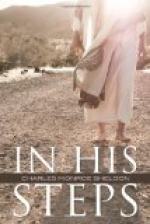The two men walked on in silence for a while. Finally President Marsh said: “We do not need to act alone in this matter. With all the men who have made the promise we certainly can have companionship, and strength even, of numbers. Let us organize the Christian forces of Raymond for the battle against rum and corruption. We certainly ought to enter the primaries with a force that will be able to do more than enter a protest. It is a fact that the saloon element is cowardly and easily frightened in spite of its lawlessness and corruption. Let us plan a campaign that will mean something because it is organized righteousness. Jesus would use great wisdom in this matter. He would employ means. He would make large plans. Let us do so. If we bear this cross let us do it bravely, like men.”
They talked over the matter a long time and met again the next day in Maxwell’s study to develop plans. The city primaries were called for Friday. Rumors of strange and unknown events to the average citizen were current that week in political circles throughout Raymond. The Crawford system of balloting for nominations was not in use in the state, and the primary was called for a public meeting at the court house.
The citizens of Raymond will never forget that meeting. It was so unlike any political meeting ever held in Raymond before, that there was no attempt at comparison. The special officers to be nominated were mayor, city council, chief of police, city clerk and city treasurer.
The evening news in its Saturday edition gave a full account of the primaries, and in the editorial columns Edward Norman spoke with a directness and conviction that the Christian people of Raymond were learning to respect deeply, because it was so evidently sincere and unselfish. A part of that editorial is also a part of this history. We quote the following:




